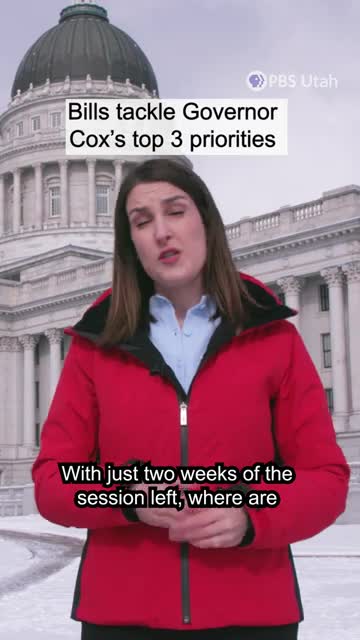With two weeks left, Utah lawmakers race to resolve Gov. Cox's housing, energy and Social Security tax priorities
Get AI-powered insights, summaries, and transcripts
Subscribe
Summary
With roughly two weeks remaining in the legislative session, Gov. Cox’s top three priorities face mixed prospects as lawmakers negotiate amendments, municipal opposition and funding, a PBS Utah summary of the governor’s monthly conference said.
With roughly two weeks remaining in the legislative session, Gov. Cox’s top three priorities face mixed prospects as lawmakers negotiate amendments, municipal opposition and funding, a PBS Utah summary of the governor’s monthly conference said.
Housing remains Gov. Cox’s first priority, and multiple House and Senate bills this year target development incentives, accessory dwelling units, mortgage assistance, zoning changes and increased density. The proposals are drawing opposition from city officials. An unnamed municipal commentator told the news conference, "We are currently opposed," and the report said some cities generally "don't like it." The transcript also quoted concerns that the measures can pit state and municipal interests against each other; one speaker described the relationship as "really hard" but said they view it "more as a partnership, not as a local versus a state."
The disagreement has left lawmakers "tweaking a couple of bills hoping to move forward," the report said, but it did not specify which bills would reach final passage or what funding, if any, would accompany the measures.
On energy policy, several bills discussed at the governor’s briefing would open the door to new resource development, including nuclear and geothermal projects. Representative Karl Albrecht sponsors one bill described in the briefing as covering "all energy projects" and calling for the creation of a "nuclear energy consortium" and a Utah Energy Council. An unnamed speaker characterized the proposal's scope by saying, "This will kinda control the whole energy scheme." The briefing linked those proposals to the governor's goal of adding generation under an "operation gigawatt" objective over the next 10 years.
Finally, the briefing addressed efforts to repeal the state income tax on Social Security benefits. According to the briefing, two bills would fully repeal the tax and a third would expand eligibility for related tax credits. The report said those proposals are stalled in the rules committee "waiting for funding." Sen. Wayne Harper, identified in the briefing as one of the sponsors, described the uncertainty about the budget process and told the news conference it is "hard to say what will make it into the final budget." The briefing added that lawmakers are debating what tax cuts to include in the final two weeks of the session.
The news conference summary did not list bill numbers, specific committee actions beyond the rules committee placement, or a timetable for votes. It also did not specify funding sources for the Social Security proposals or provide details on the specific municipal objections to housing provisions.
Looking ahead, the briefing framed the next two weeks as a period of negotiation: staff and lawmakers are revising language and considering funding trade-offs before final budget and bill votes are set to conclude the session.
